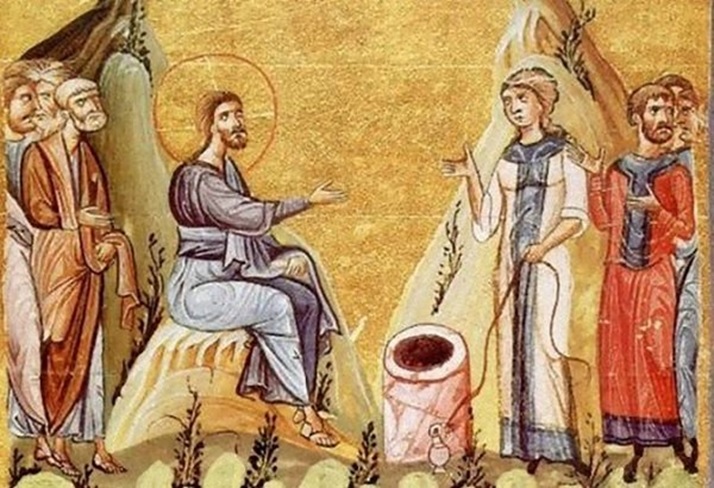Encounter with Eternal Life: ‘Whoever drinks of the water which I will give, will never thirst again’
23 May 2022Today, Saint John the Evangelist describes for us a very interesting encounter. Before we see the meeting, let’s look at the person who was to meet Christ.
The woman whom the Evangelist mentions was someone who took no thought for the morrow. She wasn’t interested in what happened next. She had no questions regarding that. She was the kind of woman who cared only for the necessities of life and the gratification of her body.
So, on one occasion she took a pitcher and went to draw water from a well. At the well, she came across Christ, who was sitting there.
He asked her to give him some water to drink. The Samaritan woman replied: ‘How is it that you, a Jew, ask a drink of me, a woman of Samaria? For Jews have no dealings with Samaritans’.
But Christ answers: ‘If you knew the gift of God, and who it is that is saying to you, “Give me a drink”, you would have asked him and he would have given you living water’.
What does this phrase ‘living water’ mean? Water which will make you never thirst again. In other words: in God you find everything that you’ve been searching for so desperately among people in the world and from yourself and, also from material things. No matter how much you eat or drink, you’re always going to want more. Something a little better than you’ve already had.

After this, we hear the Samaritan woman asking Christ: ‘Sir, you have nothing to draw with, and the well is deep; where do you get that living water?’. She took the words of Christ literally, not understanding what he really meant. At this moment, we hear the most important words from the lips of Christ: ‘All those who drink of this water will thirst again, but those who drink of the water that I shall give them will never thirst again; the water that I shall give them will become a spring of water in them, welling up to eternal life’. She asks him to give her some of this water and he tells her to go and call her husband. ‘I have no husband’, she replied. Christ tells her: ‘You are right when you say you have no husband. The fact is, you have had five husbands, and the man you now have is not your husband. What you have just said is quite true’.
The dialogue continues, with the Samaritan woman saying: ‘Sir, I can see that you are a prophet. Our ancestors worshiped on this mountain, but you Jews claim that the place where we must worship is in Jerusalem’. Christ answers: ‘Woman, believe me, a time is coming when you will worship the Father neither on this mountain nor in Jerusalem. You Samaritans worship what you do not know; we worship what we do know, for salvation is from the Jews’.
‘Yet a time is coming and has now come when the true worshipers will worship the Father in the Spirit and in truth, for they are the kind of worshipers the Father seeks. God is spirit, and his worshipers must worship in the Spirit and in truth’.
At this point, we see Christ touching on an important issue which still concerns people to this day. He tells the Samaritan woman that what she doesn’t know isn’t where to worship, but who to worship. Perhaps this is a question for all of us. We’re often content with forms: where should we worship the true God? And we’ll get different answers from different people: the Holy Mountain, Meteora, Jerusalem and so on. But the real question is who we worship.
Not what we say but what we do. We may say we’re Christians and believe in God, but our actions belie our words. We may go to church every Sunday, yet not speak to our neighbor or some relative because we’re at odds with them.
It we take anything from the narrative of Christ and the Samaritan woman, it would be our interest in our faith.
The Samaritan woman forgot her water jar when she realized that the person she was talking to was Christ. Do we know what we believe? Do we know why we say ‘Christ has risen’, at this season? Do we know that we await the resurrection of the dead? The answer, my friends, is ‘No’.
We haven’t lost our way just now; we lost it years ago. We care only for appearances. We care about which candle-stand we’re going to use and we’ll be angry if there’s no room for ours. We’re interested in ensuring that everything will be well if we have a service of the blessing of the bread, or a brief memorial service. All of this is fine, but it doesn’t go far enough.
We have to change within ourselves, We have to change who we are. We have to really believe in Christ. We have to be aware of the reason why Christ came to earth. Because he came for all of us. For you and for me.
Metropolitan Meletios of Nikopolis says: ‘Who gains eternal life eating and drinking the blood of Christ? Those who take communion as the Church invites them to: “With fear of God, faith and love”. What does this mean? With all due reverence. They fear God. They go with faith. And with love. Striving to align their heart with the will of God. This is why we must read and seek the word of God. The word of God illumes. Without God’s illumination, we act in whatever way nature tells us. As any animal would behave. Thinking only about physical needs and this present life’.
Let us strive to make God’s will be done in our life, so that we may worthily partake of his Body and Blood.
Christ has risen!






